Brian Schirmer on Comics, Economics and Bringing Black Jack Ketchum to Life at Image
In today’s era of seemingly infinite comics, with new number ones arriving on a perpetual basis, it’s hard to stand out. That’s especially the case if your comic doesn’t feature a prominent “X” in the title or, better yet, Batman within the pages. Even at Image Comics – a publisher whose star has been on the rise for more than half a decade now – we’re seeing more releases than ever, and that can impact visibility of the ones that aren’t written by giants of the industry like Brian K. Vaughan. On one hand, they still have an advantage with the Image “i” on the cover, but still, it can be tough sledding.
For a writer like Brian Schirmer, it helps when you have a great idea, a killer team to work with, and a penchant for working the promotion game hard. He has that in spades with his first Image Comics title Black Jack Ketchum, a book about…well, I’ll let the solicit for #1 do the talking here:
“In a dreamlike version of the Old West, Tom Ketchum struggles to clear his name—and stay alive—when he’s mistaken for wanton outlaw “Black Jack” Ketchum. With the aid of his talking sidearm, a secretive gambler, and a mute girl with a Winchester, Tom evades the mysterious Union and its supernatural enforcers, the faceless Dusters, as he’s forced to question his identity, his sanity, and his very existence.”
Black Jack Ketchum finds Schirmer pairing with artist Claudia Balboni and cover artist Jeremy Saliba for a mind-bending Western with an extra helping of the supernatural on the side, and it’s a provocative and unexpected read, through and through. It’s an intriguing release, and one I spoke with Schirmer about in terms of the creative side, what he’s doing to get his book out there in this increasingly cluttered marketplace, and the economics behind the project and his career. It’s a great chat, as Schirmer doesn’t shy away from anything.
Take a look, and keep an eye out for Black Jack Ketchum when it arrives on December 2nd. If it sounds intriguing, don’t forget to pre-order, as that helps a lot for a book like this.
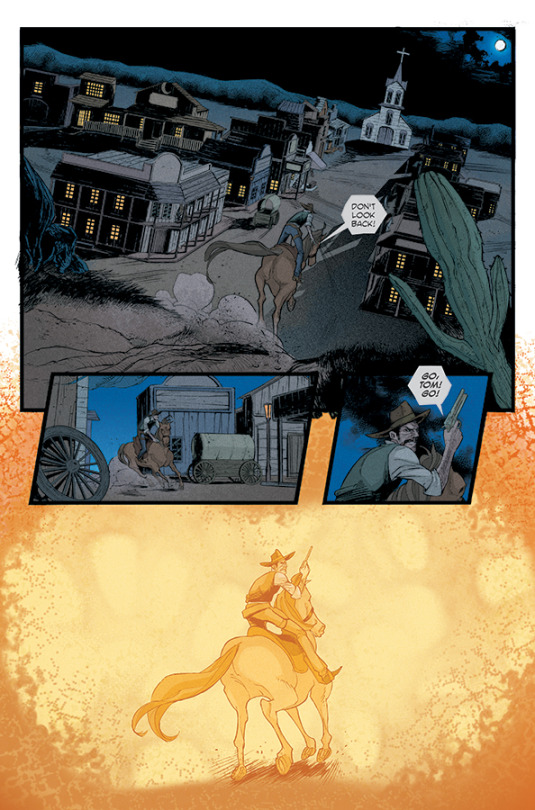 Your first Image comic, Black Jack Ketchum, is coming soon. What is the 10,000 foot view, non-solicit explanation of what the book’s all about, and why is it a story you’ve been looking to tell?
Your first Image comic, Black Jack Ketchum, is coming soon. What is the 10,000 foot view, non-solicit explanation of what the book’s all about, and why is it a story you’ve been looking to tell?
Schirmer: From the beginning, Black Jack Ketchum takes the Hitchcock notion of “the wrong man” and tosses it into a Wild West that is both familiar and very different. Tom Ketchum is a petty crook who gets mistaken for an A-list outlaw, and quickly finds himself pursued by wannabe bounty hunters and relentless, supernatural enforcers, all working at the behest of the three wealthiest men in the land. Issue One starts Tom off on his quest to clear his name, while the world around him fluctuates and fractures like a dream.
One of my favorite lines from Twin Peaks sums up “why this story” – “When two separate events occur simultaneously pertaining to the same object of inquiry we must always pay strict attention!” A couple years back, I started reading up on Ketchum, who was not only a real person, but also family. A great-grandmother on my mother’s side was a cousin of his, and I’d heard the name bandied about at family gatherings for years. Around the same time that I was doing this casual research, I had a dream. (I think this is the point where I have to put potential readers at ease and say, “No. Black Jack Ketchum will not resolve with ‘…and it was all a dream.'”) This dream was set in the Old West, but while much of the traditional iconography was present, their meanings and uses were quite different. Gunslingers in long, leather dusters became unstoppable, frontier Nazgul. Saloons were both a place you could get a drink – and a teleportation hub to any other cantina in the land. A few days after this dream, I started playing with the notion of putting Ketchum in this world.
Creators who focus on creator-owned projects have more options than ever, but Black Jack Ketchum’s running at Image. What made Image the right home for this book, and how did the project come together both creatively and with them?
Schirmer: On the one hand, Image is the place to be for creator-owned projects. Other publishers are following their lead and shepherding some quality books, but Image sets the tone. It’s the place to be. On the other hand, Image takes a lot more risks than people give them credit. Black Jack Ketchum is not an easy book. We’ll market it as a “Weird Western”, but the story will definitely stray from that pigeon-holing. That’s something that makes a lot of publishers nervous. Not so with Image. They’re in a position where they can take chances, and – to their credit – they’re doing just that.
As to how we got together with Image, Matt Fraction introduced me to Image Publisher Eric Stephenson at San Diego Comic Con 2014. I stood close as Matt pitched him Ultrasylvania, and then Eric asked for my card. About a week later we were trading emails, and a few weeks after that Black Jack Ketchum got the green light.
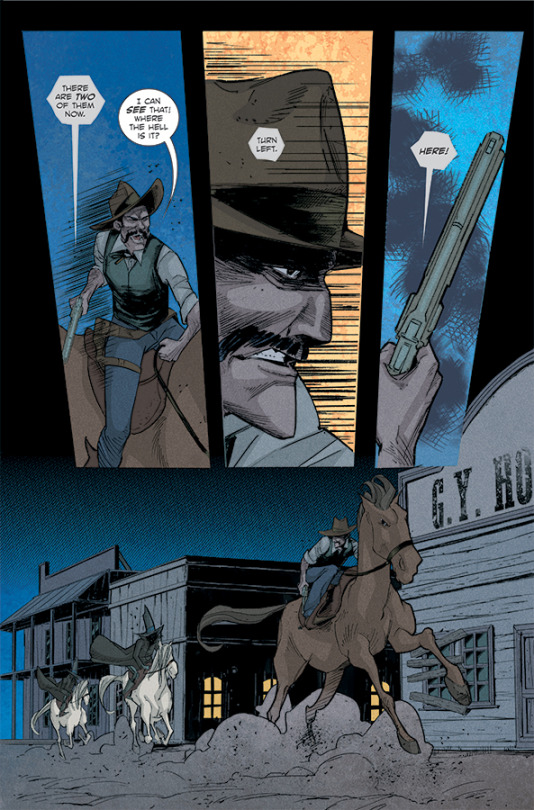 You’ve worked with Jeremy Saliba on Ultransylvania before, but at least to my knowledge, this is the first time you’ve worked with your co-creator and series artist Claudia Balboni. What made them the right creative partners for this project, both as collaborators and as the right people to bring the story to life?
You’ve worked with Jeremy Saliba on Ultransylvania before, but at least to my knowledge, this is the first time you’ve worked with your co-creator and series artist Claudia Balboni. What made them the right creative partners for this project, both as collaborators and as the right people to bring the story to life?
Schirmer: Jeremy and I have been friends for quite some time, and I watched him cut his teeth on all three volumes of Ultrasylvania. We can communicate in a shorthand that most other collaborative artists must surely envy. He’d known about the project since its earliest inception. He got what I was going for with the story. And I knew that if we were fortunate enough to land this at Image, I’d want someone in my corner with that degree of harmony.
When I was looking at artists, I really dug what Claudia had done over at IDW on series like Star Trek and True Blood. She had this really clean line work. Then, when she turned in her first roughs, it was clear that she was suddenly unchained and running free. Her work was more wild, more rugged than it was able to be while beholden to the rigors of licensed properties. She was getting to work in her own style, and brought an energy to the book that I hadn’t conceived. If nothing else, I feel Black Jack Ketchum is going to bring her a lot of overdue attention.
I think one of the most fascinating things about this book is how Black Jack Ketchum wasn’t just real, he’s – to steal a Western-ism – kin of yours. Yet it also has fantastical elements, most notably (for me at least, as I love it) a sidekick that is a sidearm. How important to you is it to strike the right balance between realism and the otherworldly elements at the core of the book?
Schirmer: When I first started working up the story, I thought it would include more historical aspects, more incidents and such from Ketchum’s life. I even flirted with it being his life filtered through the perspective that he might have suffered from emotional and/or psychological problems. But as the story developed – and this was before the script for issue one was even written – it became clear that there were more amorphous themes that I wanted to investigate in this very atypical western realm.
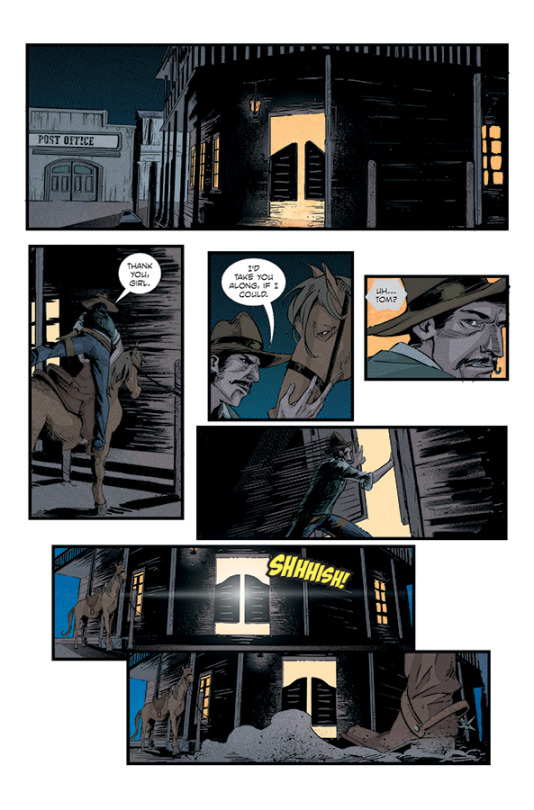 One thing that’s uncertain from what I’ve seen about so far for the book is whether or not it’s an ongoing. Is the current plan for it to be an ongoing, a mini, or a mini with the potential to flex out to ongoing? Also, how much of deciding that is built off of your plans for the story and how much is built off market viability?
One thing that’s uncertain from what I’ve seen about so far for the book is whether or not it’s an ongoing. Is the current plan for it to be an ongoing, a mini, or a mini with the potential to flex out to ongoing? Also, how much of deciding that is built off of your plans for the story and how much is built off market viability?
Schirmer: It was pitched as a four-issue miniseries with a rather definitive end. This is my first book at Image Comics, and I wanted it to be something I could cut my teeth on in that new environment. So, I wasn’t really concerning myself too much with what the market would bear so much as I was focused on coming up with a story that would be both satisfying and a good proving ground for the whole creative team.
You described Black Jack Ketchum as “not an easy book” yourself, at least in terms of marketing. With creator-owned, the onus really falls upon you: the creator. Do you have a plan for marketing the book that you’re implementing, and if so, what does it entail?
Schirmer: In addition to previews, interviews, and a few podcasts via the usual comic-based sites, I’m talking with a few Western-focused media outlets, folks who might not normally cover or promote a comic book, but might be interested in the story we’re telling. We’re also reaching out direct to as many retailers as we can, supplying them with pre-order forms, a complete preview of issue one – and as many posters as we can afford to send out.
It’s been suggested that there’s a bare minimum order that we’re likely to see for the first issue, simply based on the fact that this is an Image book. I don’t even want to think about such a thing. I just want to feel I’ve done everything that I can in order to raise awareness of the title. You know, Antony Johnston had this great post last year where he said the greatest hurdle facing creator-owned books is obscurity. We’re one of only three new #1’s launching from Image in December, alongside Symmetry and The Violent. That certainly doesn’t hurt – it’s nice to have a fairly open field – but I’m not going to take a leisurely approach and expect everything to just work out.
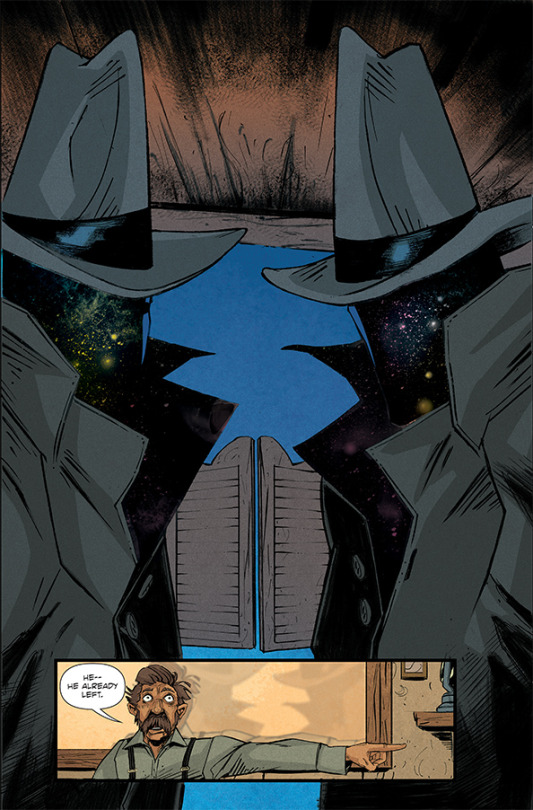 Your biggest comic before this was the webcomic Ultrasylvania. Obviously that’s a hugely different format than monthly print comics, but I’m curious, what do you think that experience has done to most help you prepare for making Black Jack Ketchum happen?
Your biggest comic before this was the webcomic Ultrasylvania. Obviously that’s a hugely different format than monthly print comics, but I’m curious, what do you think that experience has done to most help you prepare for making Black Jack Ketchum happen?
Schirmer: In addition to simply being a bad-ass story, Ultrasylvania was designed to be both a calling card and a training ground for everyone involved. I’d never done anything on that scale – from original concept, to webcomic, to three Kickstarted TPB’s in a mere two years – and I learned a great deal about self-publishing in the process. When we got the green light from Image for Black Jack Ketchum, I had more than one veteran tell me that such experience would serve me well – and it has. We brought on our own editors, solicited our own press, reached out direct to retailers – just as we did for Ultrasylvania. The social media experience associated with having promoted three successful Kickstarters certainly helped as well. Honestly, having gone through all of that over the last couple years was a godsend.
There’s been a lot of talk money in comics over the last few years, and whether or not a career in comics is really feasible besides for the biggest names at the top. With your work, you’ve went a lot of different routes for releasing and funding your work so far – webcomics, Kickstarting collections and now dropping a book through a major publisher – and seen success with all three. Have you ended up in the black on projects yet? Also, do you balance your comic work with a day job?
Schirmer: For me, writing and crafting stories is a compulsion. I was doodling my own comic strips before I could read. There was a very brief period some years ago when I considered stepping away from it, taking on a ladder-climbing corporate gig, and just living that kind of lifestyle. I couldn’t do it. I had some really successful interviews and job offers, but I never accepted any of them. Writing and creating stories – it’s just in my blood. I’ll do it until I drop.
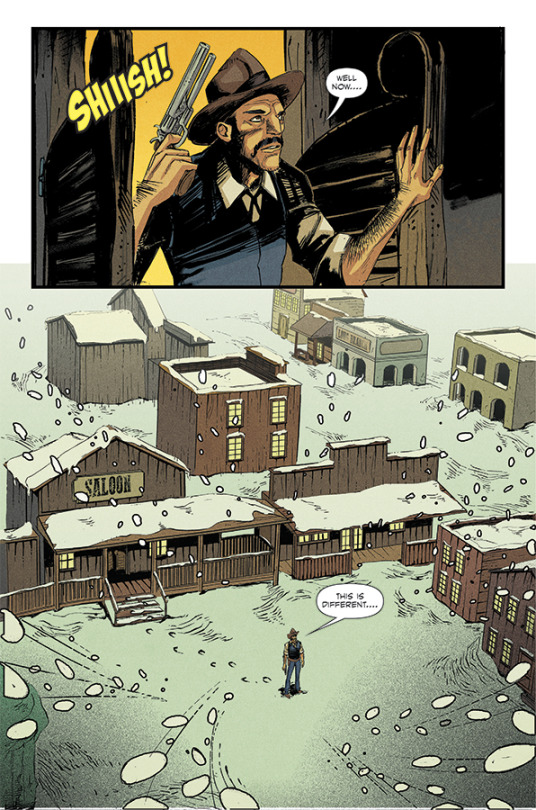 Ultrasylvania was instantly in the black. The printing of the books was covered 100% by their respective Kickstarter campaigns. I went out-of-pocket to take the books around the country to various conventions, with sales of the books offsetting some of those costs. From day one, I looked at all of that as an investment. I was investing in me. I was promoting the books, promoting myself, and making it clear to industry folks that I wasn’t going away. Given where things are now with Black Jack Ketchum, I’d say it was a sound investment.
Ultrasylvania was instantly in the black. The printing of the books was covered 100% by their respective Kickstarter campaigns. I went out-of-pocket to take the books around the country to various conventions, with sales of the books offsetting some of those costs. From day one, I looked at all of that as an investment. I was investing in me. I was promoting the books, promoting myself, and making it clear to industry folks that I wasn’t going away. Given where things are now with Black Jack Ketchum, I’d say it was a sound investment.
Black Jack Ketchum is another matter. On a project of this scale – by a fairly unknown creative team – there are no advances from the publisher. All moneys that have been put out to the creative team – whether advances or page-rates – have come from my pocket. So, I’m currently in the red. If the book does well, I’ll get into the black. If it does really well, I might see some profit. In either scenario, this project ideally leads to the next one. Once again, I’m looking at this as an investment in me.
With all of that said, I’m certainly pragmatic. I’m the Department Manager for the School of Animation & Visual Effects at the Academy of Art in San Francisco, where I also teach a class in writing for comics. The job pays a respectable salary, covers me with insurance, and puts a roof over my head in my favorite city in the U.S. Plus, given that it’s an art school, I’m constantly surrounded by folks who are very supportive of my comic endeavors. You can’t put a price on that.
You shared Antony Johnston’s line about how the greatest enemy of creator-owned is obscurity, and that certainly backs what I’ve heard from others. To you, what makes Black Jack Ketchum stand out amongst what’s being published today, and why do you think readers and retailers should be excited for it?
Schirmer: If you like mystery, if you like a bit of the surreal, if you like to see someone take genre tropes apart and put them back together in meaningful ways, or if you just love Claudia’s kick-ass artwork, then this book’s for you. I’ve had more than one person tell me that this book treats you like an intelligent reader who can handle a challenging story. I like the sound of that. That’s certainly something I look for in the comics that I read, so it makes sense that’s what I’d deliver. I’ve likewise been warned – by some folks who have more experience – that I might be expecting too much from the readers. I’m looking to prove those folks wrong.
Interested in pre-ordering Black Jack Ketchum #1? Share the Diamond code OCT150488 with your local retailer to make sure you get a copy. Remember, especially for creator-owned, every pre-order helps!
